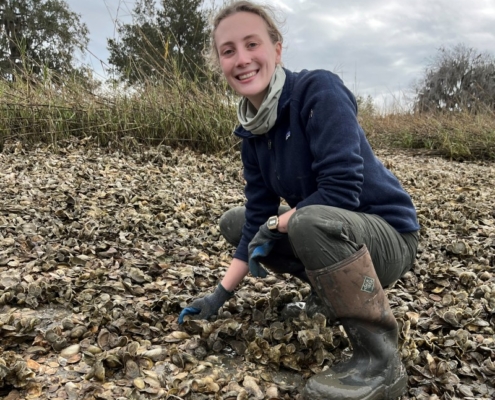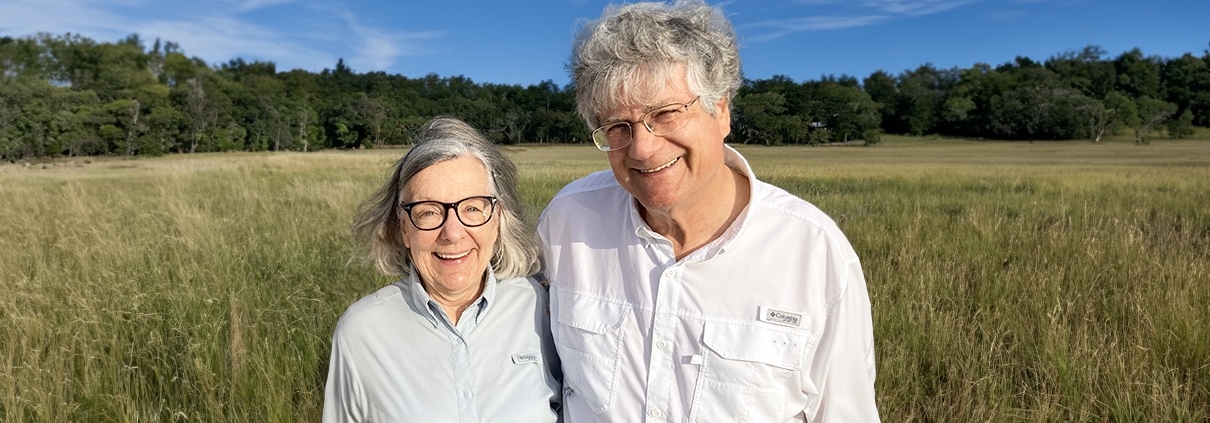Pathway to discovery: professors endow student research
Jim and Karen Porter retired in 2016, but their impact on students continues long after and far beyond the classroom.
For ecology students at the University of Georgia, the names “James and Karen Porter” are almost as synonymous with the Odum School of Ecology as Eugene Odum himself. Jim, a Josiah Meigs Distinguished Professor Emeritus, and Karen, also a professor emeritus, have collectively dedicated more than a half-century of teaching, research and service to UGA while using their expertise to guide a spotlight back to the university and student efforts.
Jim, who won an Emmy and a Peabody Award for his participation in the award-winning documentary “Chasing Coral,” and Karen both retired in 2016, but their journeys as Bulldogs were far from over. The couple further secured their legacy at the Odum School by establishing the James W. and Karen G. Porter Endowment fund to support undergraduate ecology students’ research.
Kate Moore (BS ’23) was the first student to receive financial support from the endowment, which allowed her to travel to Miami to attend the annual Benthic Ecology Meeting in the spring of her final year at UGA.
“Receiving that award really felt like an acknowledgement of all the hard work I’d put in,” Kate says. “It was the perfect opportunity for me to show on my CV and to my peers all the research that I have done at UGA.”
Giving to students in this way accomplishes a few goals, in Kate’s opinion. First, this type of financial assistance is a way to help students overcome barriers to participate in research. Scholarships like the ones from the Porter Endowment provide students with opportunities outside the classroom — opportunities which, for some, may be unattainable yet integral to their future career success. Students can focus solely on the research they’re passionate about; they don’t have to split time and energy with a job just to cover necessary expenses.

Kate Moore (BS ’23) was able to participate in hands-on research opportunities because of the Porter endowment fund.
Second, it’s an opportunity to show the world the type of groundbreaking research that UGA constantly produces. The funds from the Porter Endowment also provide assistance for students to travel to conferences and present their findings to peer institutions and fellow ecologists.
Jim Porter was retired by the time Kate was able to benefit from his legacy, but other former students, who are now donors to the endowment, were just as impacted by his presence at UGA. Felton Jenkins (BS ’90) made his decision to attend UGA based on his meeting with Jim. When Felton was accepted into the Foundation Fellows program, his interest in UGA grew. But it was a personal tour from Jim, an advisor to the program at the time, that sealed the deal.
“He took me on a tour and introduced me to Gene Odum, the father of ecology as an academic discipline,” Felton recounts. “I knew that UGA was the right choice for me after that experience.”
One of Felton’s most formative memories as a student was getting SCUBA-certified during a course, which culminated with a trip down to the coral reefs of the Florida Keys. Based on his experience in an earlier course with Jim, one of the world’s leading coral reef researchers, Felton was able to appreciate the coral reef experience much more deeply.

Felton Jenkins (BS ’90) made his decision to attend UGA based on his meeting with Jim, and continues pursuing his passion for ecology.
Years after his graduation, Felton returned to UGA as an alumni member of the Odum School of Ecology Advisory Board. One of the board’s first goals was to set up strong, enduring support for Odum students. After learning of the Porter Endowment, Felton leveraged his alumni network, particularly from his time as a Foundation Fellow, to rally other Bulldogs into contributing to the fund established by the Porters, thus achieving the board’s goal to support Odum students in perpetuity.
Despite decades between their experiences at UGA, both Kate and Felton serve as examples of the impact faculty can make on students through teaching and giving back long after their time in the classroom.




